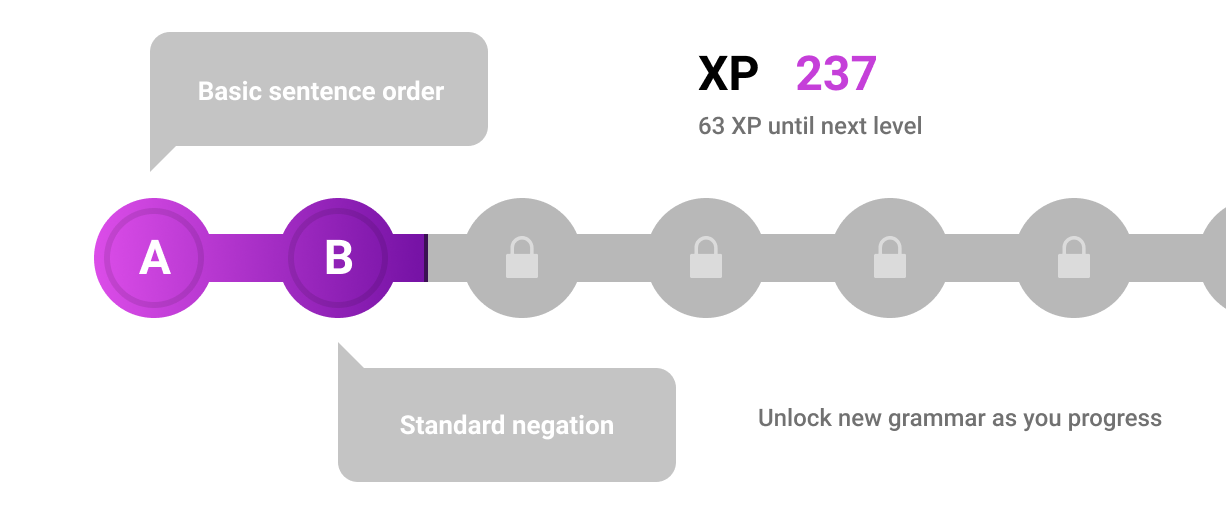Micro Learning Futures
This is a small spin-off project of my longer-term goal of creating a Collaborative Learning Platform.
Brief
The goal of this challenge is to explore the future of learning through a series short design concepts. These could be design modifications to existing tools (e.g. forums or video conferencing) to make them more conducive as a learning environment, concepts for new learning tools, ways to improve current educational institutions or learning spaces within cities, or anything which relates in some way to imagining new futures for learning.
Challenge
Each day of November (2019) I will write a small description, accompanied with mockups or sketches if necessary to illustrate (at least) one design concept.
The challenge is being run on the FNS Forum , where other users can build discussion around each design concept, or introduce design concepts of their own. Feel free to head over to there to participate in the discussion.
Outcome: only finished half the challenge (15/30)
Inspiration
A Pattern Language
(#43: University as a Marketplace)
Transformative Tools for Thought
Building complex reasoning skills online through open-ended activities
Other Internet Workshops
And Keita’s Quick Ideas , a collection of quick design and gameplay ideas for the now-dead game, Glitch. Putting this here because it’s a good representation of the general format I’m aiming for with these design concepts.
Concept #1
I find it difficult, in video chats especially because of the potential lag, when I have an idea for what to say but don’t want to interrupt the person talking. In classrooms there is the idea of raising your hand if you have something to say and the teacher will call on you when they have finished speaking.
What if there was an ‘idea ping’ or ‘raise hand’ button then you can tell the other people that you have something to say and they’ll open up the conversation to you. Just a small visual + sound cue which draws attention without creating an interruption.
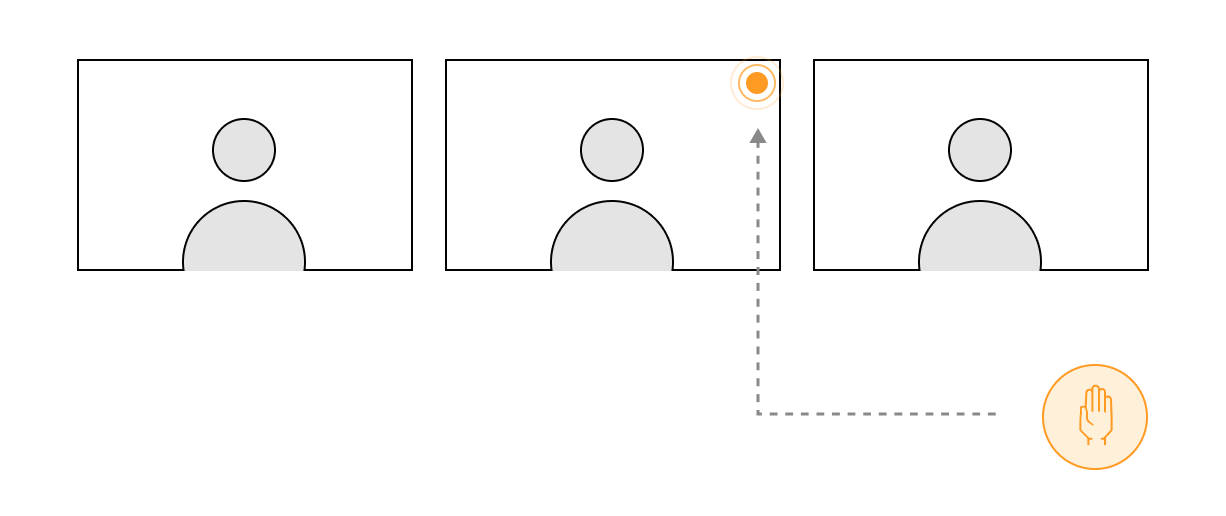
Concept #2
Similar to concept #1 , but relating to the overall structure of a discussion. Sometimes when someone finishes talking or sharing, there is an awkward silence where everyone is likely thinking "ok, what's next?".
What if in preparation for a meeting, everyone creates a list of topics to bring up or ask during the discussion. One can also add to their list of topics during the conversation to make note of an idea for later. These could show up as a little box or circle next to their video panel which you can look into/expand. Or see a list on the side of all the topics. Could possibly even be dragged out or clicked on to form a basic outline of conversation so that everyone knows what's next.
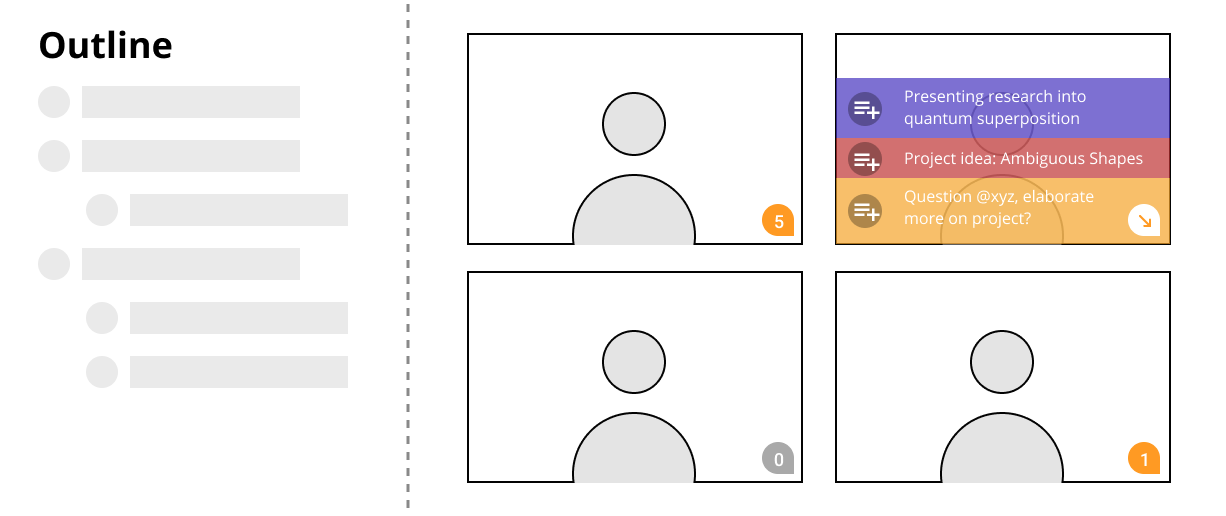
Or perhaps, instead of everyone writing their own list, there could be a collaboratively-edited outline for the conversation on the side. Through this, at the beginning of the conversation, the group can decide on an overall plan to guide the discussion forward.
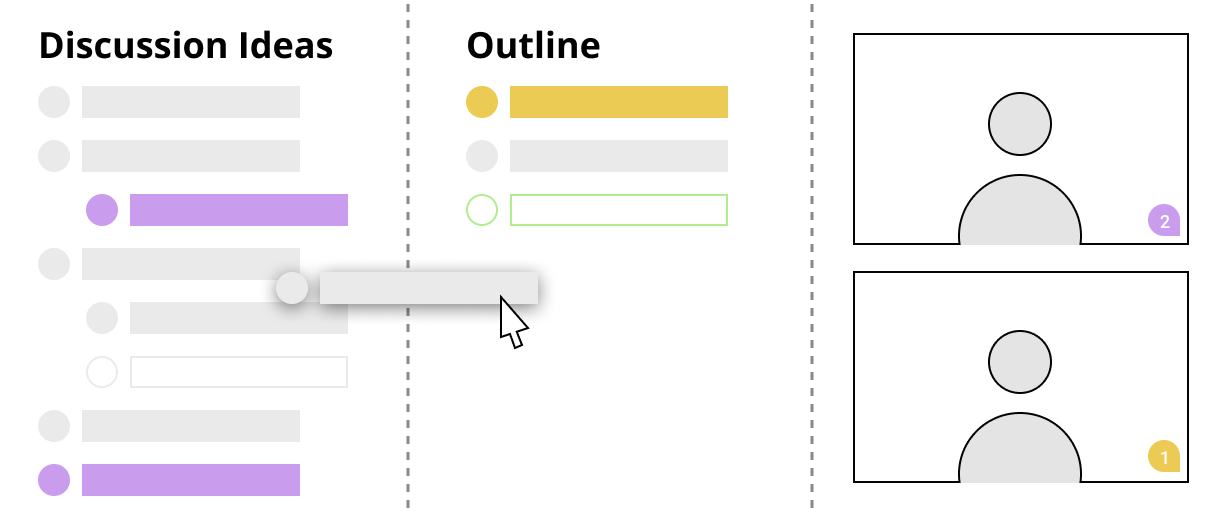
Concept #3
When I take part in discussions where everyone takes turns presenting, introducing themselves, or sharing what they've done/learned this week, it can be unclear when one person finishes who should go next.
What if there are a set of tools to help structure conversation. For example when you're done presenting or introducing yourself, press a button and the next person is prompted to begin. Or have a button to instantly split the group into random (or chosen) breakout groups to have separate conversations and then reconvene back to the main group.
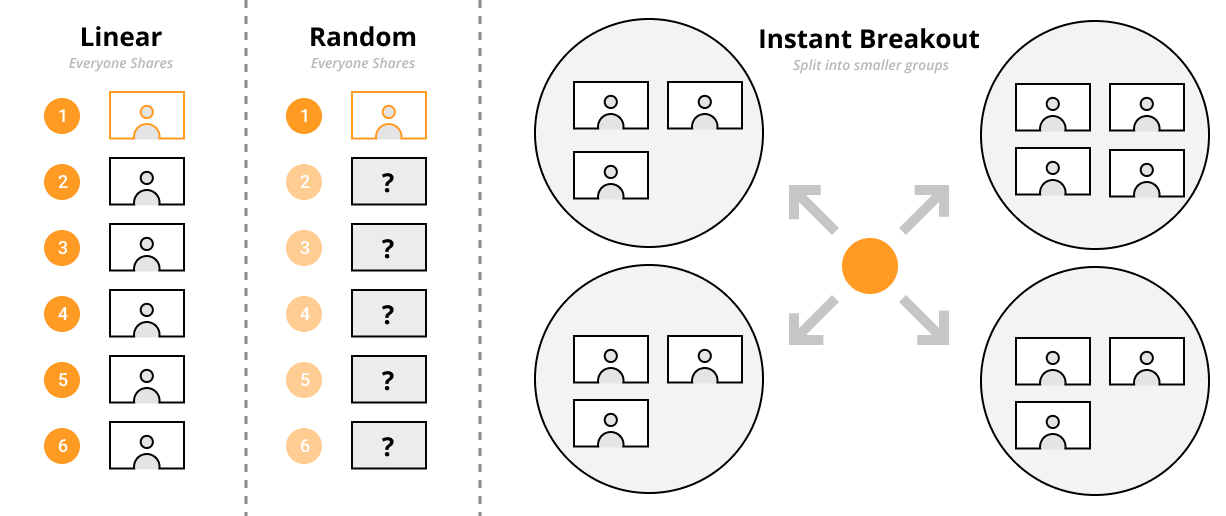
Structure Tools Brainstorming
- Everyone takes turns sharing
- Linear — everyone knows order
- Random — nobody knows who's next; reduces anxiety/anticipation?
- Choose — presenter passes 'talking stick' to whomever they choose
- One-click breakout groups
- Random — groups randomly assigned
- Chosen — groups created, each person chooses which one to join; or chosen beforehand
- Set topic for each group?
- Set timer for discussion (or for each person sharing)
- Time budgeting — suggestion @jared
- Create shared docs or drawing pads as part of conversation
- Icebreaker games facilitated by computer, using combinations of these structure tools
Metrics Preamble
One could argue that in a sense retweets and even likes aren’t social media but asocial media because they provide no real information or context. They aren’t an interaction but merely an indication.
— Bix ( source )
I have been thinking about Metrics and how they affect people's behaviour and thought. When designing a platform, special thought should be given to what numbers you show to users, and what those numbers really mean.
With forums for example, I find [# of views] rather meaningless, [date last posted] to be intimidating (inactivity breeds inactivity; feels weird to post), and likes sometimes raise more questions than answers.
I want to explore the question: what metrics are useful, and how can we reframe metrics or redesign how we interact or react to information in an online medium?
Concept #4
Instead of using numbers, what if metrics are represented through shape, size, or colour?
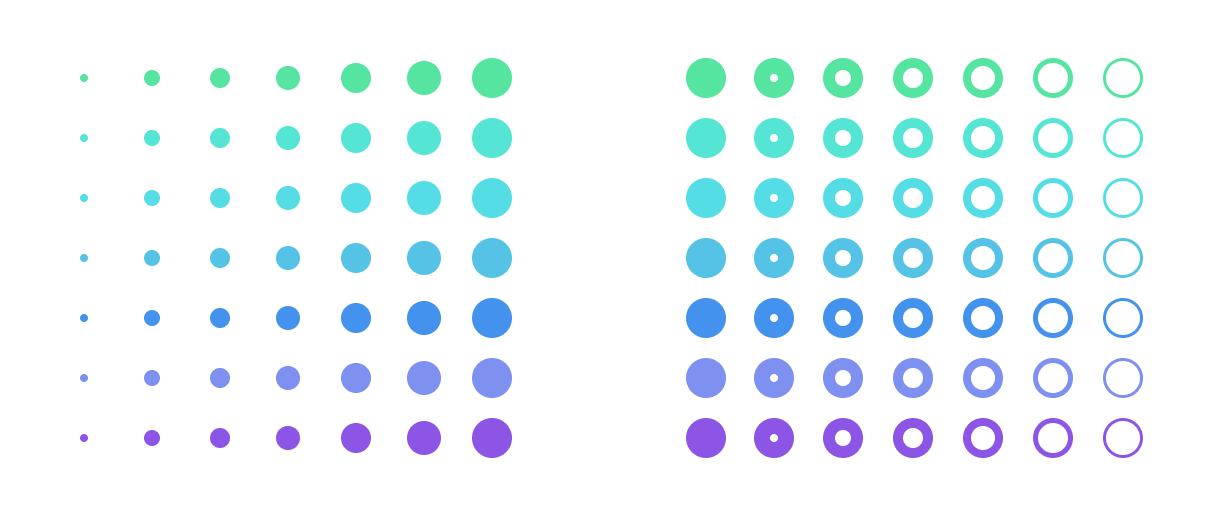
Some experimentation would be necessary to figure out best mappings of data to shape, colour, size, etc.
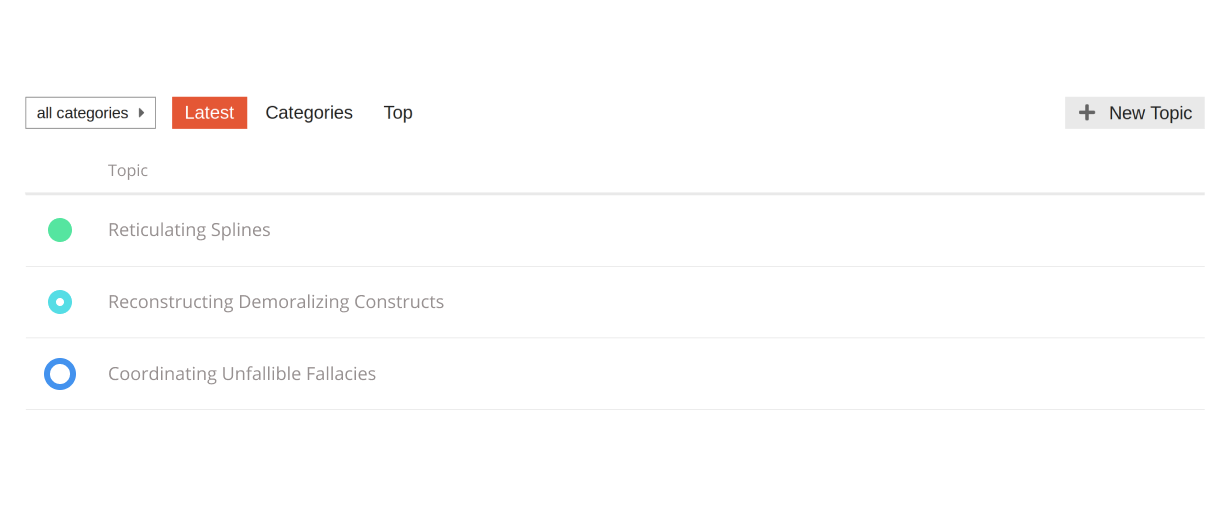
If change in colour is part of the data visualization, a colour-blind friendly gradient/palette should be designed for accessibility.
Concept #5
Instead of liking a post, what about highlighting the parts you liked or commenting on them. Some blogging platforms already allow for this, but I have not seen the feature in forums or other discussion areas. Would give more context than just adding a like, and allow for types of comments and replies which would be strange to make an entire post-reply for...
Perhaps different types of highlighting / annotation:
- Pointing out errors (grammar, spelling, citation) — perhaps only seen by OP
- Questions
- Short comment
- Related material or links
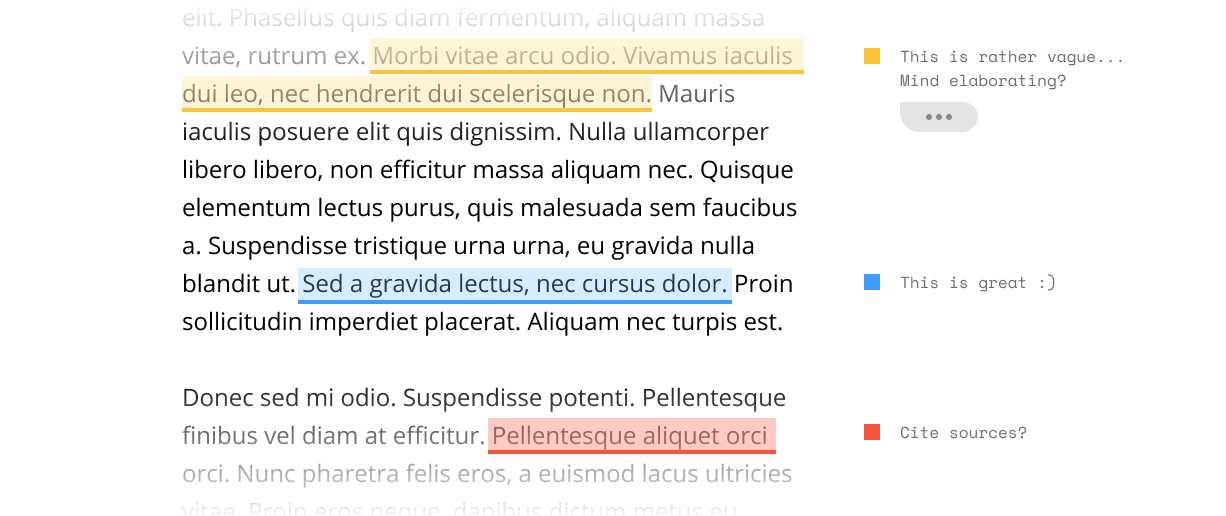
Concept #6
Education should focus on community. Creating an online learning platform or space of learning, the focus should be primarily on building community and rapport between students.
Most online education (and traditional university and high school education) focuses essentially on trying to download information onto your brain, like in the matrix but slow and soul-destroying 😛
I believe that one of the barriers to creating community in classrooms is the power dynamic between student and teacher. Some of the best teachers I've had acknowledge this and take a step down to ignite discussion between students, with them acting as the "knowledgable-but-not-allknowing peer."
Another barrier is classroom size, too big and it's difficult to ignite discussion or build community, too small and it just becomes a group of friends (or a silent stare-down if they're lost for ideas).
Some questions:
- If the role of a teacher is removed, would students more easily build community with each other around learning a topic they are all interested in?
- What would be
the optimala good class size for building community and discussion? For some reason the number 15 comes to mind, small enough to know everyone, but large enough to have a good set of idea and experience diversity among students to ignite and continue discussions.
Concept #7
“And now all the Hawtchers who live in Hawtch-Hawtch are watching on
watch watcher watchering watch, watch watching the watcher who’s
watching that bee. You’re not a Hawtch-Watcher you’re lucky you see!”
– Dr. Seuss
Something that is more active and perhaps meaningful than “liking” a post would be to “watch” a post or discussion. To signify interest in the topic and that you may contribute to the conversation in the future but don’t have anything to say just yet.
If you haven’t visited a post that you’re watching for a while, not actively reading or participating in discussion perhaps the watching marker disappears? Or perhaps the profile images could become faded, this would show that there were X amount of people following this topic, but they haven’t looked at it for a while.
If someone is timid about posting in a forum conversation, perhaps “watching” the thread would be a first step to breaking the mental barrier of joining in with their own ideas?
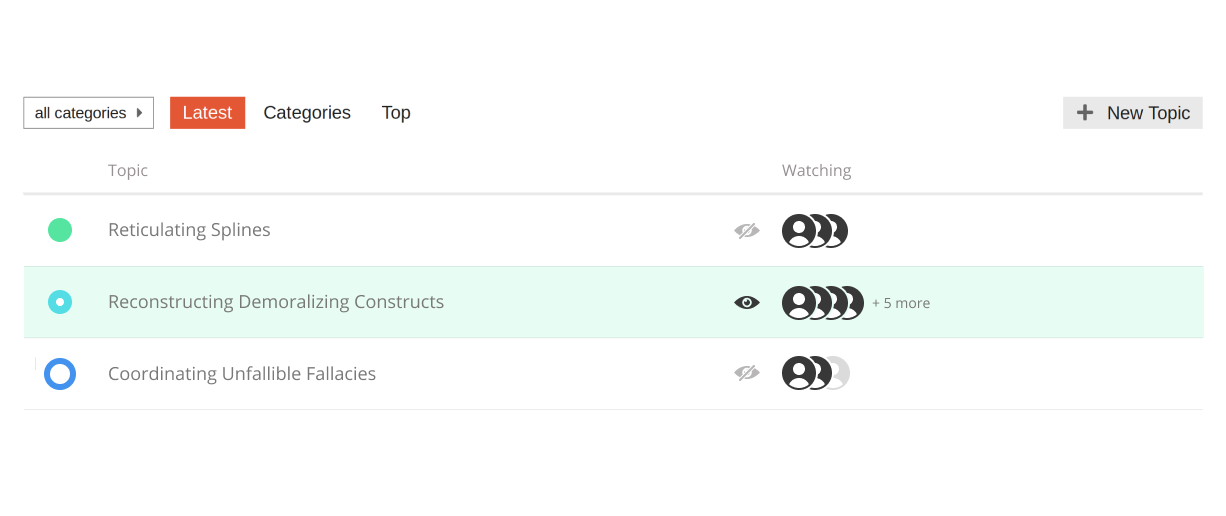
Concept #8
With a collaborative learning environment online, there should be an easy way to share and interact with different resources found online. If students seek out each week resources to share and discuss with each other, there should be a more convenient way of keeping track of these resources.
While it is possible to do something similar with a forum model, I think that it would be more effective to tailor the interface specifically to keeping track of these resources. Or it could be integrated into the design of a forum, but be a different mode of displaying the same information (similar to how Notion can display databases in different styles: list, table, gallery, calendar)
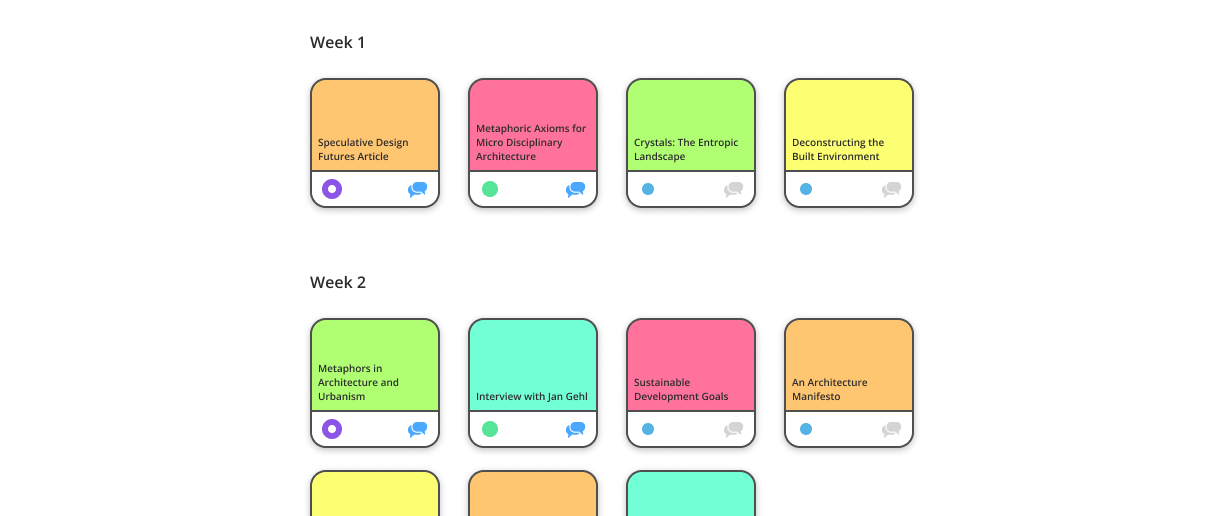
Different mediums of resources (books, articles, videos, lectures, research papers) could possibly be colour coded or have icons to signify the type.
Perhaps (and this is not pictured in mockup), in a similar vein to concept #7 above, there could be list on each resource of how many people have “watched” or “read” it completely, or in the case of longer resources such as books, who is in the process of reading…
Concept #9
Asking and answering open-ended questions can be important in a self-directed learning process. Both coming up with the question itself and going through the process to answer it and think about different perspectives.
Open-ended questions can also be important in exploring ideas for the future. In classrooms teachers can only teach what they know which involves past and present, but considering future possibilities or possible innovations typically goes beyond their area of expertise and is rarely considered. In a collaborative learning environment, there can be a larger focus on not only what was but also what could be.
I imagine collectively deciding or voting on questions or topics each week which become the main discussion and research topics for that week.
Sort of like CJ Eller's blogging futures but collectively deciding on one to three topics each week (or if one topic is considerably engaging, continuing the discussion on to the next week)
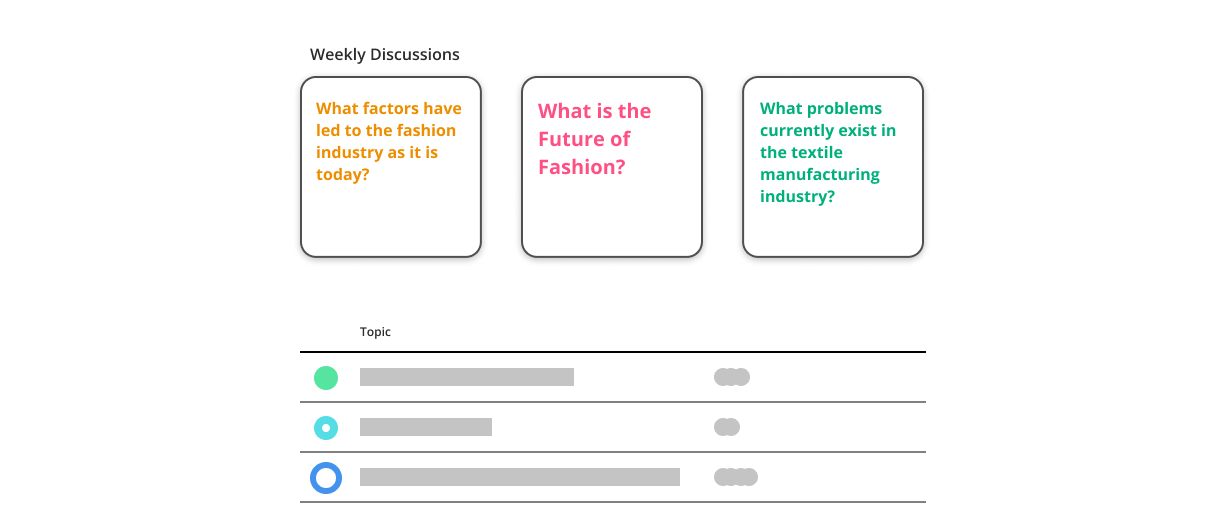
Concept #10
In imagining a platform of collaborative learning, where students come together to learn together without necessarily requiring a teacher, I have thought that it could be interesting to have an "imaginary class listing." Essentially a list of class ideas, in which people can register interest, and if enough people sign up as interested (and have overlapping free-time in their schedules to meet), then the course becomes a reality.
Online education typically makes use of the internet's scale to make courses for thousands of people, however I think that the benefit of the internet could be in bringing people together around niche topics. An imaginary class listing would bring together some of these niche ideas that people might be interested in learning and shows that these are classes that could exist.
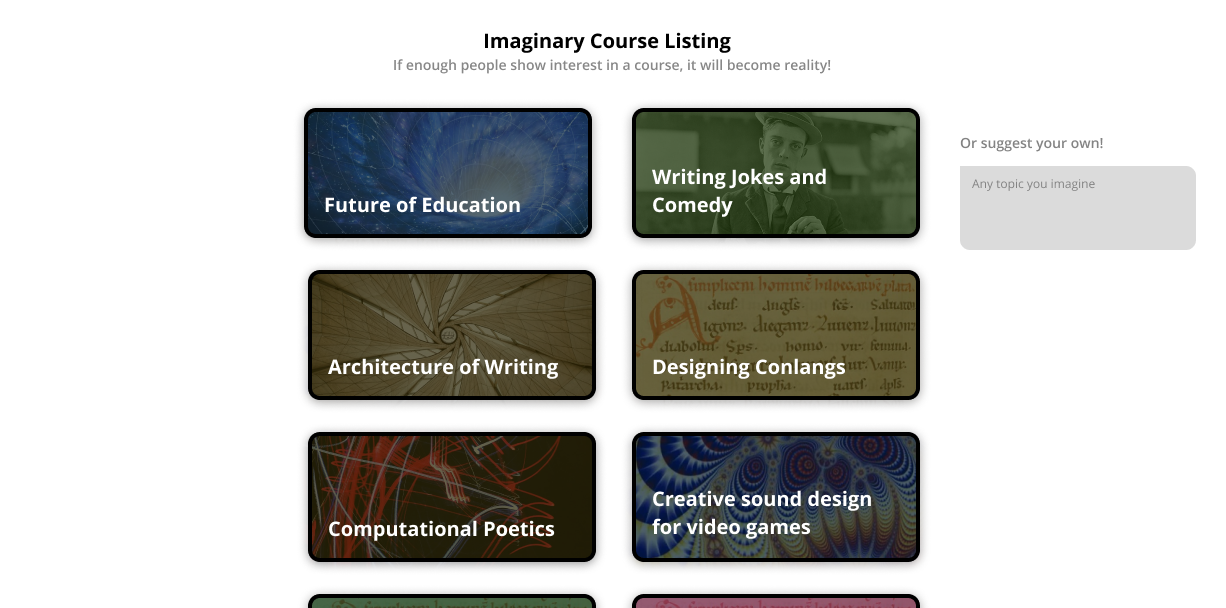
Concept #11
Going in a slightly different direction today; looking at language learning mnemonics.
One type of mnemonic is too associate a word in a foreign language with a more familiar word in your own language. For example the french "poisson" (fish) with the english word "poison". And while creating associations like this can be helpful, it can also be misleading at times. It may lead you to misremember the definition (perhaps poisson is poison...) or to misremember the pronunciation (excuse me sir, I would like to order some poison).
To improve on this existing technique, I suggest breaking each word down into smaller phonetic components and associating familiar words with each. For example, the spanish word "mundo" could be broken down into "mun+do" and then associated with english words "moon door."
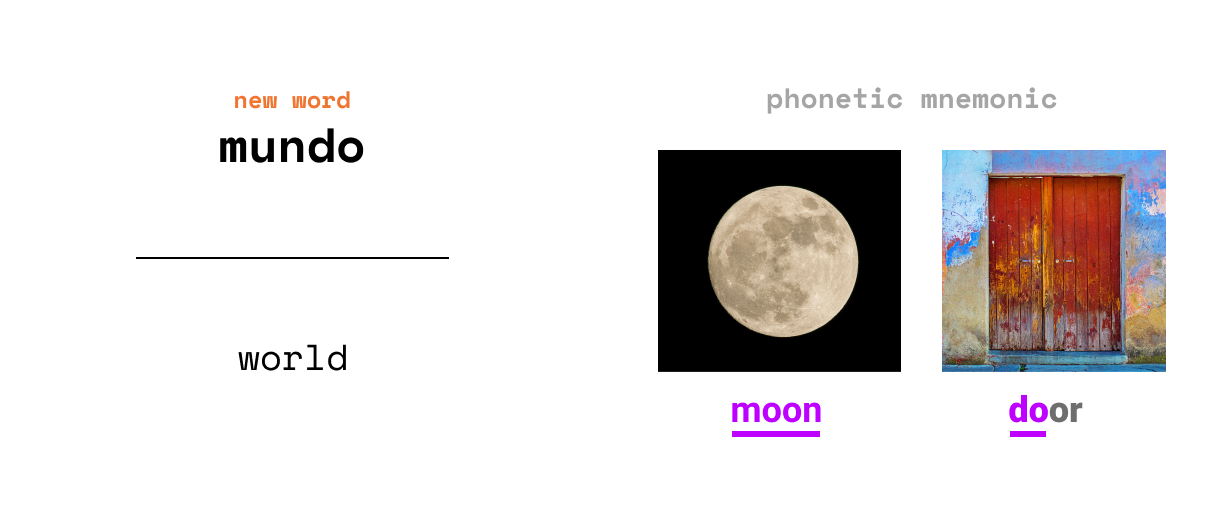
Then, to make it more memorable you can turn the associations + the definition into a little story. Perhaps you see a door standing in the middle of a field and you walk through it straight onto the moon, and you look up and see the whole world, planet Earth floating above you in the sky.
Like this you will more easily remember the pronunciation of a word, and have more associations which makes it easier to remember later. And in my experience, more associations actually decreases the likelihood of confusing one of the associations with the definition of the word, especially when you put them all together into a story.
Concept #12
From infancy we begin learning our mother tongue through trial and error. Combining words and creating basic sentences, and even if we get words out of place or mess up the grammar of a sentence, we are continually learning in the process.
Most language learning programs facilitated by technology aim to teach words or grammar rules but don't encourage this kind of experimentation with formulating your own sentences.
It would be interesting to incorporate writing into language learning. Like you are given a set of words and possibly a grammar rule or tense and asked to formulate a sentence or two using those words. Being able to quickly formulate a written sentence in a foreign language would be very helpful later in both speaking and thinking in that language.
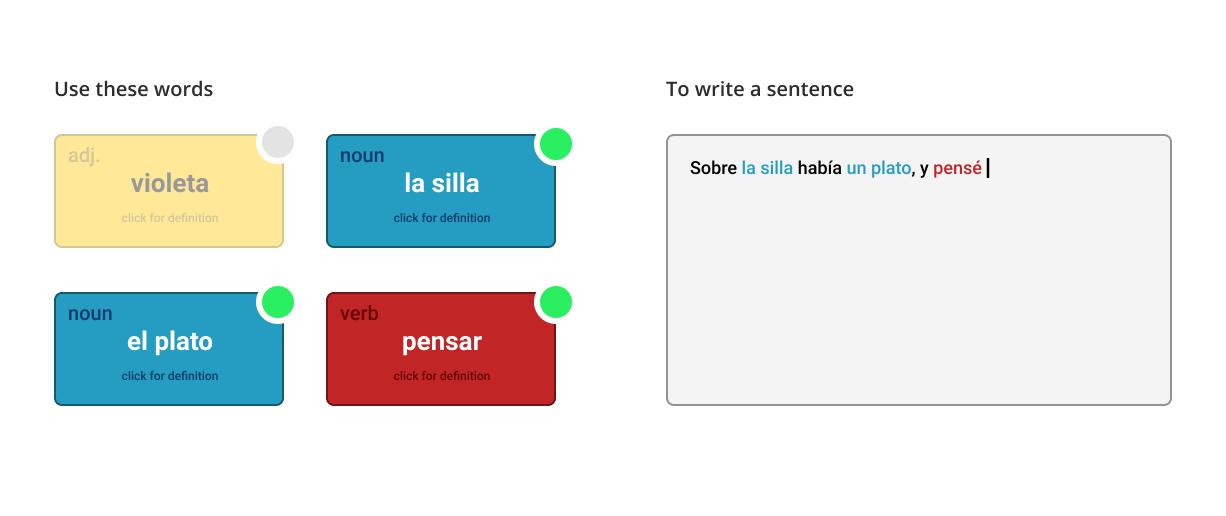
Concept #13
Building off concept #12 , it could be interesting if the system not only allows for the learner to write their own sentences but also has the ability to detect common grammar errors and mistakes.
But there would be a problem, if you show mistakes immediately when they submit their sentence it can get very discouraging very fast because they might be making small mistakes each time.
So I think that it could introduce a new type of language-learning exercise where it shows you a sentence that you've written in the past and asks you to identify and fix where you may have made a mistake. This reframes the problem from "darn, I got this wrong" into more of a detective game where you have to conciously think through grammar rules and revise your own writing.
On the technical side, something like this would be helpful: https://languagetool.org/
Concept #14
One of the most fabled memory techniques is called a memory palace where you place bits of information or memory around a physical location that you're familiar with (e.g. the rooms in your house), and then you walk through that place in your imagination to remember. It is not typically technique often used by laypersons but by memory champions and ultra-dedicated language learners, etc.
It occurs to me that using augmented reality on our phones, we could create a similar process of placing memories words (in the case of language learning) around the world. I imagine having an app where I can point my phone at an object in my house and type in the word for that object in english, for example, "p-l-a-n-t" and then the app will place the word for "plant" in that location in the language that I'm learning.
It could also utilise concept #12 and ask you to write a sentence in the foreign language using the newly learnt word for "plant".
And for a community aspect of language learning, there could be designated "memory palace" locations around the city where labels are shared between all users. Like, you could walk into a mall and see clothing words in the clothing store, different shoe words in the shoe store, and technology words in the tech store.
Concept #15
I typically detest gamification in learning apps. It always seems very gimmicky and if the app isn't fun to use without gamification, I personally feel that my mind sees through all the points and achievements and gets bored quickly.
I am reminded by a common game-design advice when making platformer video games. To focus first on making the movement and jump mechanics feel fun, even in a blank room before adding any other gameplay elements.
But I wonder if gamification can be used for good... In what ways could gamifying something reframe how we see that thing in a good way.
Take concept #12 for example, imagine that every time you write a sentence in the app it rewards you points, maybe more points for longer or more thought-out sentences, or for using a wider range of words. And then when you gain enough points you "level up". Now, by itself that would be kind of silly, but I imagine that every time you level up, you might gain a new grammar rule or language learning tip. This could reframe grammar learning from "oh I should probably get around to learning these grammar rules and tenses" to "ooh, I get to learn this new grammar rule if I write a few more sentences"
I'm not entirely sure that this kind of gamification is much better than the alternative, but it is certainly interesting to think of the ways game-like elements can reframe the context of an online situation.
